
Assamese cinema, is an Indian film industry of Assamese-language. It is based in Assam, India. The industry was born in 1935 when Jyoti Prasad Agarwala released his movie Joymoti. Since then the Assamese cinema has developed a slow-paced, sensitive style. In beginning the industry were called Jollywood, named for Agarwala's Jyoti Chitraban Film Studio.

Jahnu Barua is an Indian film director. He has written and directed a number of Assamese and Hindi films. Some of his notable films are Halodhia Choraye Baodhan Khai (1987), Firingoti (1992), Xagoroloi Bohu Door (1995), Maine Gandhi Ko Nahi Mara (2005), Konikar Ramdhenu (2003), Baandhon (2012), and Ajeyo (2014).
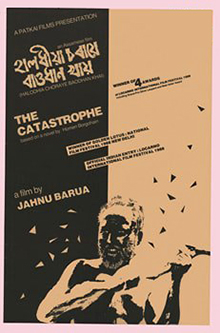
Halodhia Choraye Baodhan Khai is a 1987 Indian Assamese-language film made by director Jahnu Barua. It won the National Film Award for Best Feature Film in 1988 and multiple awards at the Locarno International Film Festival in 1988. It was the third full-length feature film made by Barua.
Sailadhar Baruah was an eminent film producer from Assam, India. He is best remembered for his visionary contribution to Assamese Cinema as the producer of some of the greatest Assamese movies ever made, such as Halodhia Choraye Baodhan Khai and Xagoroloi Bohudoor.
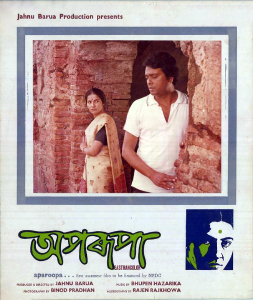
Aparoopa is a 1982 Indian Assamese language drama film directed by Jahnu Barua. It is the first feature film of the director and also the first Assamese film produced by National Film Development Corporation of India. It stars Biju Phukan, Suhasini Mulay, Sushil Goswami and Girish Karnad. The Hindi-language version is titled Apeksha.

Papori is a 1986 Indian Assamese language feature film directed by Jahnu Barua. The film stars Gopi Desai, Biju Phukan, Sushil Goswami, Chetana Das and Dulal Roy. The film was released in 1986.
Bonani is an Assamese language drama film directed by Jahnu Barua. The film stars Sushil Goswami, Bishnu Kharghoria and Monami Bezbaruah. The film was released in 1989. The film is set with an ecological angle and won National Film Award for Best film on environment.
The 35th National Film Awards, presented by Directorate of Film Festivals, the organisation set up by Ministry of Information and Broadcasting, India to felicitate the best of Indian Cinema released in the year 1987. Ceremony took place in April 1988 and awards were given by then President of India, R. Venkataraman.
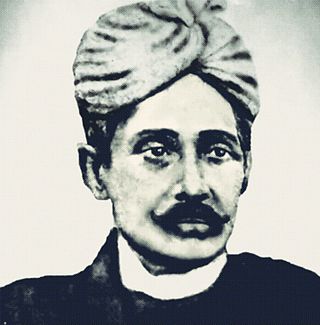
Maniram Dutta Baruah, popularly known as Maniram Dewan, was an Assamese nobleman in British India. He was one of the first people to establish tea gardens in Assam. While he was a loyal ally of the British East India Company in his early years, late he was hanged by the British for conspiring against them during the 1857 uprising. He was popular among the people of Upper Assam as "Kalita Raja".

Ganesh Gogoi dv(1907– 1938) was a poet of Assam and then he is remembered also as a lyricist, composer, playwright, actor and football player. He is also known as Papori Kobi.
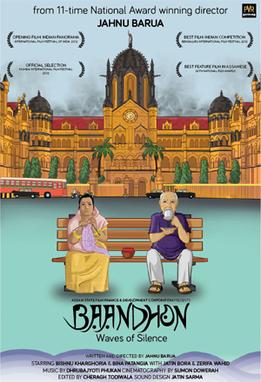
Baandhon is a 2012 Assamese language drama film, starring Bishnu Kharghoria and Bina Patangia in the lead roles. The film was directed by Jahnu Barua and produced by Assam State Film Corporation Limited. The film was initially released on 26 October 2012 in the state of Assam and later on 5 July 2013 in selected PVR theaters across rest of India.
Jupitora Bhuyan is an Indian actress works in the Assamese films. She worked in a few Assamese films along with VCD films and telefilms. She is also part of Assamese mobile theatre industry debut by playing lead female roles in Kohinoor Theatre. She is especially known for playing extraordinary character with a powerful appearance.

Indra Bania was an Indian theatre actor, playwright, film actor and director from Assam. His performance in Jahnu Barua's Halodhia Choraye Baodhan Khai earned him the Silver Leopard Best Actor's award at the Locarno International Film Festival. He was the recipient of the Natasurya Phani Sarma Award.
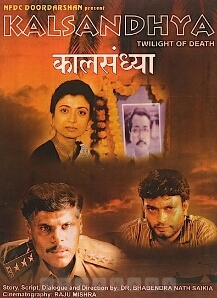
Kaal Sandhya is a 1997 Indian Hindi crime drama film dwelling on militancy in Assam, directed by Bhabendra Nath Saikia. The film deals with the theme of the impact of the insurgency on common people. It stars Jatin Bora, Ashish Vidyarthi, Debashree Roy, Nipon Goswami, Pranjal Saikia, Hemen Barman, Munin Barua and Mridula Baruah in the lead roles.
Prodyut Kumar Deka is an Indian film director, screenwriter and author residing in Assam, India. His films include Dhunia Tirutabur, Samiran Barua Ahi Ase, Surjasta, Borosi, Chiyahir Rong, Ji Golpor Ses Nai and The Government Servant. He turned to writing english fiction gradually from 2016-17 with the anthropological Ambari Series based on the Ambari Archeological site in Guwahati.
Assam State Film Corporation Ltd. (ASFFDC) is an organization undertaken by Government of Assam which aims in developing and promoting the legacy of Assamese cinema. It was incorporated on 4 September 1974 under Companies Act 1956 by the Government of Assam.

The Guwahati International Film Festival (GIFF) (Assamese: গুৱাহাটী আন্তঃৰাষ্ট্ৰীয় চলচ্চিত্ৰ মহোৎসৱ) is an annual film festival held in Guwahati, Assam, India.The State Government-owned Jyoti Chitraban (Film Studio) Society organised the festival in association with the Dr. Bhupen Hazarika Regional Government Film and Television Institute. The first ever Guwahati International Film Festival (GIFF) to be held in northeast India, which will be inaugurated on 28 October 2017 by Assam Chief Minister Sarbananda Sonowal. The Assam government supported festival began on 28 October with screening of the Oscar winning ‘The Salesman’, directed by Asghar Farhadi and produced by a joint collaboration of Iran and France.

Film Appreciation on Cinemas of Jahnu Barua: Women, Children, Political and Psychological Perspectives is a research book written by Dr. Juhi P. Pathak and published by Redshine Publication. The book is the second part of a trilogy on the works of Jahnu Barua, a prominent Assamese filmmaker.

Tuloni biya, also referred to as Xoru Biya, Nua-tuloni, or Santi Biya, is a traditional Assamese Hindu ceremony that marks the attainment of puberty in girls and celebrates the girl's transition from childhood to womanhood. The Tuloni biya, which translates to "small wedding", is accompanied by a multitude of rituals and traditions, all rooted in the concepts of purity and separation.













